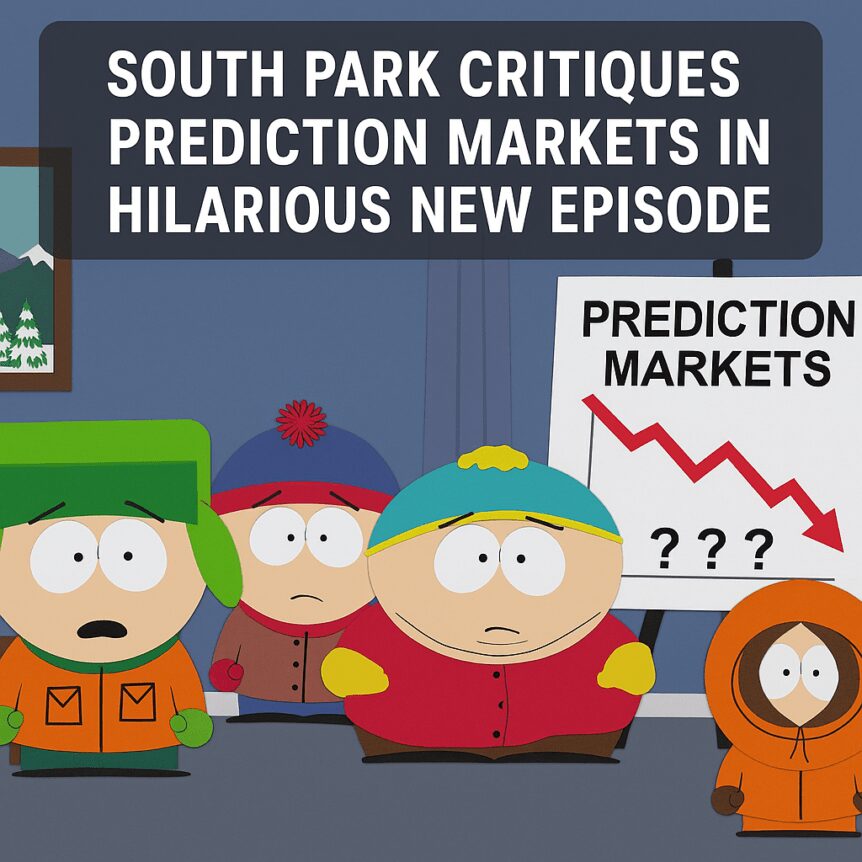South Park Critiques Prediction Markets in Hilarious New Episode

Certainly! Here’s a rewritten version of the article that maintains the original HTML structure, improves flow, and adheres to journalistic standards for trustworthiness and clarity:
—
The satirical animated series South Park continues to engage with contemporary topics, this time turning its sharp wit toward prediction market apps within its latest episode. As the show delves into financial and political themes, it offers a humorous yet pointed critique of how regulators and industry figures interact with blockchain-based prediction platforms, reflecting ongoing debates within the crypto community and regulatory landscape.
- South Park’s newest episode satirizes prediction markets, regulatory oversight, and the personalities involved.
- The show depicts fictional bets on school lunches and geopolitical conflicts using parody prediction apps.
- Regulatory tensions are highlighted, with recent legal victories for platforms like Kalshi and Polymarket under the CFTC’s evolving stance.
- South Park has a history of parodying cryptocurrency and blockchain themes, reflecting its cultural relevance.
- Legal developments suggest a potential softening of US regulation for crypto prediction platforms.
In its episode titled Conflict of Interest, South Park’s elementary students debate the use of prediction markets, joking about bets on mundane school topics as well as global conflicts. The episode humorously portrays these platforms, reminiscent of Kalshi or Polymarket, and parodies their role in democratic and financial discourse. The show even pokes fun at regulators like the U.S. Commodity Futures Trading Commission (CFTC) and the Federal Communications Commission (FCC), suggesting they act as “strategic advisers” rather than strict overseers.
Fictional Kalshi bet on South Park. Source: Comedy CentralSouth Park’s satirical take on crypto and blockchain technology is nothing new. The series has previously mocked the industry—calling Bitcoin a “fly-by-night Ponzi scheme,” criticizing Trump’s alleged connections to crypto, and ridiculing NFT enthusiasts. Its ongoing commentary keeps cryptocurrency themes in public discussion, often highlighting the speculative nature and regulatory challenges surrounding digital assets.
The season launched shortly after Paramount Global, the show’s owner, settled a $16 million lawsuit from Donald Trump over alleged deceptive editing related to interviews—all part of South Park’s consistent legal and cultural battles. Throughout its run, the show has remained a sharp critic of U.S. politics and financial regulations.
Federal Scrutiny of Prediction Markets Eases in the U.S.
Kalshi, a prominent prediction platform, has experienced a notable shift in U.S. regulatory treatment. Previously embroiled in a legal dispute with the CFTC, which ordered the platform to cease offering political event contracts, the company achieved a favorable court ruling. Although the CFTC appealed, the regulator ultimately decided to drop its case in May, under the leadership of acting Chair Caroline Pham.
Similarly, Polymarket has benefited from this more lenient regulatory environment. On September 3, the CFTC issued a no-action letter to two Polymarket entities, authorizing the platform to offer event contracts without the usual reporting obligations. CEO Shayne Coplan expressed optimism, stating the CFTC’s move signaled the “green light to go live in the USA.”
This recent relaxation of regulation appears to imply a potential shift toward a more accommodating stance on crypto prediction markets, which could foster greater innovation within the U.S. digital asset ecosystem.
Further insights into the evolving regulatory landscape can be found in analyses of the acceptance and skepticism surrounding cryptocurrencies across different cultures and legal regimes.
This article was originally published as South Park Critiques Prediction Markets in Hilarious New Episode on Crypto Breaking News – your trusted source for crypto news, Bitcoin news, and blockchain updates.
You May Also Like

Privacy Coins Rally Driven by Technicals, Narrative

‘Survival Mode’ Activated: Bitcoin Miners Struggle As Hashprice Collapses
